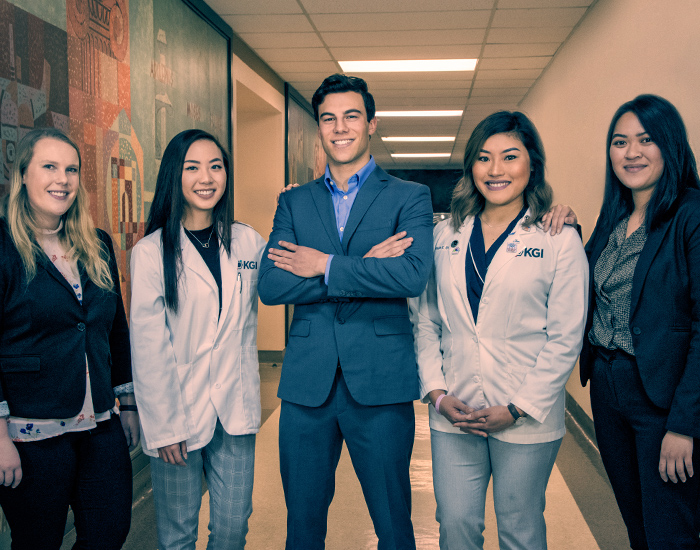Given the current shortage of primary care providers, the School of Pharmacy and Health Sciences (SPHS) at Keck Graduate Institute (KGI) is developing a new Master of Science in Physician Assistant Studies program (MSPA). Physician Assistants (PAs) work as integral members of the healthcare team and practice in a number of clinical settings.
The demand for PAs is expected to grow by 31 percent nationally through 2028 as it becomes more difficult to recruit and retain physicians in rural and underserved areas. The average PA sees 73 patients per week or 449 million patients nationally each year, making them an important link between the public and the nation’s healthcare system.
PAs primarily serve in the areas of Family Medicine, Surgery, and Emergency Medicine. New laws have gradually been expanding their autonomy and scope of practice.
Today, PAs can carry out many of the same roles as physicians, including evaluating and diagnosing patients, referring patients to a specialist, prescribing certain medications such as antibiotics, providing hospice care to terminally ill Medicaid patients, and ordering and interpreting lab tests.
Dr. Martin Zdanowicz, SPHS Dean, sees multiple benefits that PAs can offer when it comes to healthcare.
"Studies have shown that PAs can actually lower overall healthcare costs while improving the quality of healthcare,” Zdanowicz said.
“PAs have the ability to provide more direct patient interactions. They have been shown to spend more time with patients than often times physicians are able to and they can reduce wait times for patients. They also increase access to healthcare in rural areas, which is very important."
Career prospects for a PA are promising. The median salary for PAs in California is $133,910, and the program is only 24-28 months, compared to four years of medical school followed by a three- to seven-year residency program to become a doctor.
KGI anticipates that its PA program will start in fall 2022 and enroll approximately 40 students. A full-time program director and dedicated PA faculty will be recruited, while current professors in SPHS will also teach classes in the MSPA program.
There are 250 accredited Physician Assistant programs across the United States, and KGI is not the only school to house a MSPA program within a pharmacy school. What will differentiate KGI's program, however, is more in-depth instruction and training around genomics.
"All PAs are expected to have some fundamental knowledge of genetics and genomics and a basic understanding of pharmacogenomics," Zdanowicz said. "Since that's one of our areas of specialty, though, we will place a greater emphasis on personalized medicine and the role of genomics and genetics in healthcare."
While a strong GPA is important when it comes to admitting students to the program, KGI will use a holistic process that evaluates the student across a broad spectrum of criteria. This includes community service, clinical shadowing experience, life experience, and excellent interpersonal and communication skills.
In addition to the new MSPA program, the KGI School of Medicine is in its early planning stages.
“There is a healthcare crisis in Southern California, and there’s a shortage of hundreds of primary care physicians in Los Angeles County,” said KGI President Sheldon Schuster. “By building the MSPA program and our School of Medicine, we can do our part to address some of these issues.”
For more information about KGI’s new Master of Science in Physician Assistant Studies program, visit kgi.edu/mspa.
